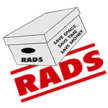How to keep your businesses financial documents in check!
Physical paper may be disappearing rapidly but “paperwork” (i.e. administration) is very much still an essential part of business.
Physical paper may be disappearing rapidly but “paperwork” (i.e. administration) is very much still an essential part of business. In fact, arguably, having a “paper trail” is more important than ever. That’s because it’s increasingly common for businesses to need to demonstrate compliance rather than for regulators to demonstrate fault. At the same time, you want to avoid a paper mountain.
To explain further, Gavin Prior, Operations Director at Rads Storage, shares his top tips.
Start with the law
The law is a baseline not a target but it’s a clear place to start formulating your approach to document management. In simple terms, you need to know what you need to do to comply with it and to avoid breaking it. These are slightly different.
You also need to keep in mind that laws can and do change. In the context of business, the general direction of travel tends to be towards strictness rather than relaxation. This means that you need to stay alert to changes. The good news is that legal changes are normally signalled long in advance of their implementation.
At present, financial documents you really need to keep would typically be invoices, bills and expense receipts, bank statements and tax documents. "Tax documents" means anything related to tax rather than just tax returns. For example, it might include documents explaining why you completed a form in a particular way or correspondence with HMRC.
Try to keep personal data out of financial documents
If financial documents have any personally identifiable information on them then they are covered by GDPR. To minimize your responsibility here, try to use generic contact details as much as possible. For example, use generic inboxes such as “[email protected]” and job titles instead of personal emails and individual names. This can also help to minimize disruption when people move on.
Remember that HMRC currently requires you to put an individual reference number on all invoices. It’s often good practice to put individual references on other documents. This may help to reduce the need for other identifiers (e.g. personal names). It should definitely make it easier to search for documents, especially if you use a consistent numbering system.
Know what documents have to be stored in paper format
For the most part, HMRC has learned to love digital. Currently, the only documents you need to keep in paper format are non-VAT-related tax documents. Even then you only need to keep physical paperwork if they were delivered to you on paper in the first place. If you received them electronically, you can keep them electronically.
Although you generally want to minimize the number of unnecessary documents you keep, it’s probably worth taking an electronic copy of any documents you need to keep on paper. This may buy you some leeway from HMRC if anything happens to the originals. That said, you still want to do everything possible to avoid putting this to the test.
Have a system for managing your documents
One of the many advantages of going digital is that it can make document management a whole lot easier. A lot of the time, you’ll be able to come up with ground rules and then just use automated tools to handle the day-to-day implementation of them. They’ll still need human supervision of course. The overall workload can, however, be massively reduced.
Where paper is impossible (or at least very difficult) to avoid, you should try to digitize it as quickly as possible. These days, the obvious example of this is expense receipts. If you’re using bookkeeping software, then there’s an excellent chance you’ll find a partner app to scan receipts and enter the key details directly into your accounting package.
If you’re not, you can simply have your staff take pictures of their receipts as soon as they get them. Both Android and iOS phones have the facility to back up photos to a cloud drive. This should put an end to lost receipts. Similarly, if you get mail, just scan it immediately upon opening. Then decide what to do with it.
Use backups and archives effectively
If you are actively using a document then you need at least one backup of it (at least two is better). If you’re not actively using a document but still need to keep it, then you should archive it. Understanding the difference between backups and archiving can make your life a whole lot easier. It can also make your costs a whole lot more affordable if you are using cloud storage.
The reason for this is that cloud-storage providers tend to increase their prices according to the speed with which storage can be accessed. Backups need to be able to be accessed fairly quickly. They, therefore, need relatively fast (i.e. expensive) storage.
Archived documents, however, are unlikely to be needed urgently. For example, you have 30 days to respond to a GDPR subject-access request. They can therefore go into relatively slow (i.e. low-cost) storage.
Invest in offsite storage
Regardless of whether you’re inside or outside the cloud, it’s best to have a copy of key documents in an offsite location. This gives you a Plan B if anything happens to your main cloud/business location. If you’re outside the cloud, offsite storage can also be used to reduce the load on your own infrastructure.
Keep your data up-to-date
You probably don’t get sentimental about financial documents so there’s nothing to be gained by holding on to them when they have ceased to be needed. What’s more, if they have any personal data on them, you may be obliged to delete/destroy them to comply with GDPR.
Dispose of old financial documents carefully
If you’re still keeping financial documents on paper, then you absolutely must ensure that they are properly shredded before being recycled. In fact, it may be advisable to get a third-party vendor to do this for you. This will also give you an audit trail if any questions are asked about your data security.
For digital documents, make sure that you delete all copies of them. If documents are really sensitive, then you may wish to deep-clean (or destroy) the storage on which they resided.
About the Creator
Gavin Prior
Gavin Prior is the General Manager at Rads Document Storage, a secure facility based in Nottingham which provides professional document management services.







Comments
There are no comments for this story
Be the first to respond and start the conversation.